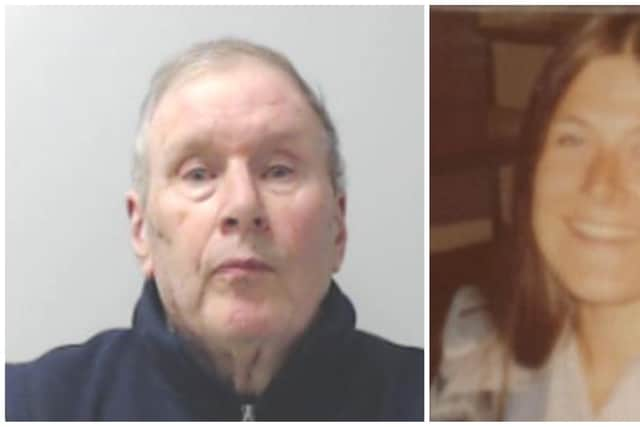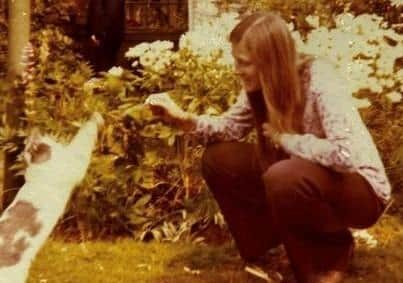Brenda Page: Ex-husband guilty of murdering scientist in 1978 after cold case breakthroughs
Christopher Harrisson was convicted at the High Court in Aberdeen of murdering 32-year-old Dr Brenda Page within her home on Friday 14 July, 1978, partly through advances in DNA evidence – which Dr Page’s family say is fitting given her research work in the 1970s as a genetic scientist.
It has been one of Scotland’s longest-running murder investigations and Police Scotland’s Major Investigation Team (MIT) instigated a re-investigation in 2015.
Advertisement
Hide AdAdvertisement
Hide AdHarrisson was arrested and charged in connection with Dr Page’s death in March 2020. Jurors heard how he subjected her to a prolonged campaign of domestic abuse including coercive and controlling behaviours throughout their relationship. This behaviour culminated in her violent murder.


Using the latest techniques, a minute flake of paint found on Dr Page’s bedroom window - which had been forced open - was found to match the paint on Harrisson’s Mini Traveller car.
Further, DNA samples taken from within Dr Page’s flat were examined by specialists using the latest forensic techniques. The court heard that one sperm sample was 590 million times more likely to have come from Christopher Harrisson rather than from any other male unrelated to him.
Along with original statements, some still in manuscript from the 1970s, and carefully recorded testimonies of witnesses who had since passed away, the breakthroughs became powerful circumstantial evidence.
In a statement after the verdict, Dr Page’s family said: "We as a family are absolutely delighted with the verdict of today's trial. Brenda's murder, nearly 45 years ago at the incredibly young age of 32, has affected the family and so many of her friends, work colleagues and of course Police Scotland.


"Not a day goes by when we don’t think about Brenda and the horrendous ordeal she must have suffered that night. Brenda was an extremely kind, intelligent woman with her whole life ahead of her. It hurts us to think of the great things she would have undoubtedly achieved.
"Forty-five years is a long time to be at liberty whilst the family have endured such tragedy, sadness and loss. Reliving these events over and over again each time Brenda's case was re-investigated or publicised in the media was difficult to say the least.
"It is a great sadness that some of our family and friends are no longer with us to see this day but we are delighted that Brenda's sister has finally seen Christopher Harrisson found guilty of the brutal crime she always knew he committed.
Advertisement
Hide AdAdvertisement
Hide Ad"We extend our sincerest thanks to Police Scotland's Major Investigation Team in Aberdeen and Crown Counsel and COPFS for keeping Brenda's case open and tirelessly pursuing the justice today has brought. Their respect towards Brenda and our family will always be remembered. Also to the many witnesses who have helped Brenda get justice today. We appreciate the stress and anxiety this process must have caused over the many years, especially giving evidence. Our heartfelt thanks go to each and every one."
Detective Inspector Gary Winter added: “Brenda was never forgotten and hope remained that one day her murderer would face the consequences of his actions. For Brenda’s family, colleagues, friends and everyone who has worked on this case over many years, that day is finally here.
"Various improvements in available evidence since 1978 allowed the investigation to progress to trial. Part of this is down to a better understanding of domestic abuse and abusive relationships which has helped us highlight what Brenda went through over many years. I would like to thank all those who have assisted with our investigation and in particular those who helped at the time of the murder and the friends and colleagues we revisited during our most recent investigation, many of whom have sadly passed away.
"Thanks also to all the forensic scientists who worked on the case over five decades. Brenda’s family and colleagues have commented upon how pertinent and fitting it is that DNA has played a part in solving her murder given her research work in the 1970s as a genetic scientist. A special thanks to many within the COPFS too including the Cold & Complex team at the Homicide Unit through to Advocate Depute and Crown Counsel Alex Prentice KC for taking the case to trial.
"Police Scotland ensures that time is no barrier to justice - unresolved and undetected murder cases are never closed in Scotland. The investigation of homicides is an area where the national police service has driven high standards of investigation and compassion. The ability to respond professionally and thoroughly, and provide answers for families, is a core duty of policing."
The investigation into the murder of Dr Page has been subject to ongoing reviews over the past four decades, culminating in the final re-investigation in 2015 by MIT North. This review assessed all the available material gathered over five decades. It reviewed previous witness statements and included, where possible, re-interviewing people who had given information about the case. Modern investigative and forensic techniques were considered and applied.
Harrisson’s conviction is the latest ‘cold case’ to come to trial and comes just months after the resolution of another of Scotland’s historic murders.
In September last year, 81-year-old William MacDowell was sentenced to at least 30 years imprisonment for the 1976 murder of his lover and child. The bodies of his victims have never been found.
Advertisement
Hide AdAdvertisement
Hide AdIn 2021, a DNA breakthrough helped secure the conviction of Graham McGill, some 37 years after he murdered Glasgow woman, Mary McLaughlin.
And in 2019, Zhi Min Chen was jailed for a minimum of 20 years for killing Tracey Wylde at her home in Glasgow in 1997.
There are currently several unresolved murders being reinvestigated under the direction of the Crown’s specialist homicide prosecutors.
